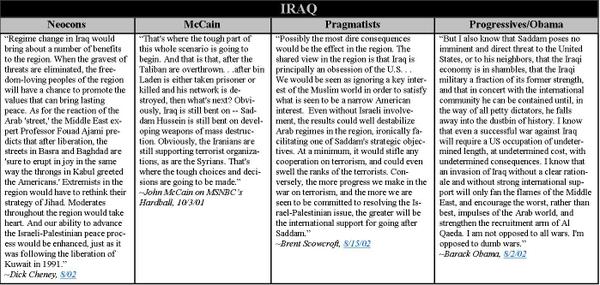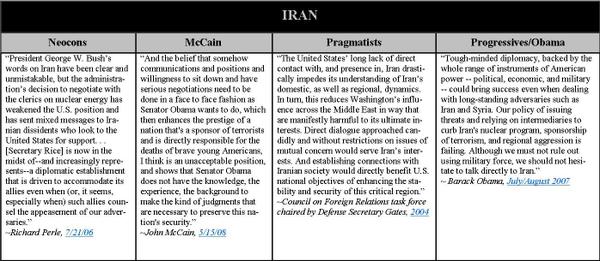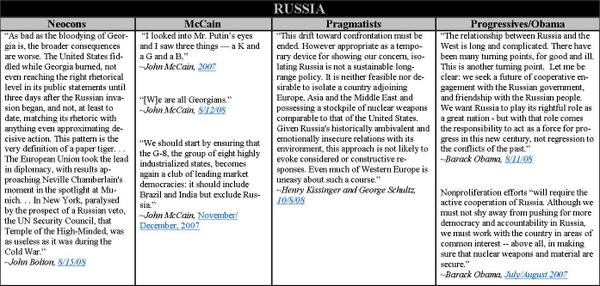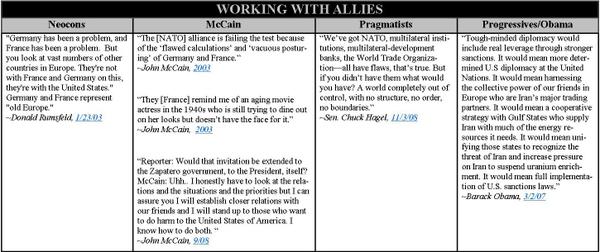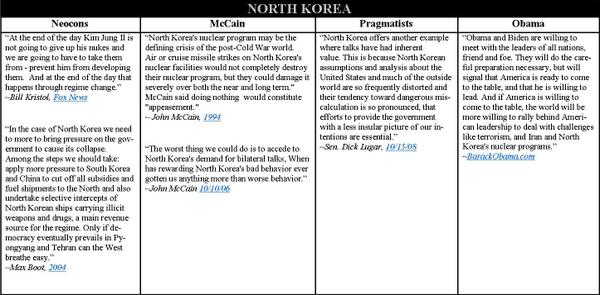Trying to argue against statements from the McCain campaign is like entering a circular-logic firing squad. Since on any given issue, they aggressively adopt both sides of the argument and position themselves where it is most expedient (ex. immigration, strikes inside of sovereign countries,
talking to adversaries, the Future Combat Systems, etc.).
The most recent example of this is defense spending. The McCain campaign emailed out a statement today attacking Obama for
associating with Barney Frank who is for cutting defense spending by 25
percent. Randy Scheunemann in the statement seemed very outraged and
demanded clarification on Obama's position - which happens to be pretty
clear. Obama is going to cut some weapons programs that have been proven
to be ineffective, but which likely costs nowhere near 25 percent. The rub is that there is little difference between McCain and Obama on this issue.
(Warning you are about to enter the circular logic firing squad)
McCain has long said he would cut
defense spending, this is a position he maintains today. Obama has also said he will cut defense spending. But McCain opposses Obama and therefore attacks Obama today for having the same position that he has. So it is not that McCain was for cutting defense spending before he was against it. It is that McCain is simulataneously both for and against cutting defense spending. So to paraphrase his position: McCain is for cutting spending, but McCain is against Obama cutting defense spending, so when Obama is for cutting, McCain is for increasing (except he's still for cutting). Clear?
So the problem I have is do I:
A. Argue that McCain is being a hypocrite for also calling for cutting defense spending.
or
B. Argue that McCain has hugely unrealistic defense plans that will actually blow the Pentagon budget.
Hmmm. Why chose. I argue, you decide.
Critique A: McCain is a hypocrite who has consistently called for cutting defense spending. McCain this summer pledged to cut defense spending. McCain's top economic advisor Douglas Holtz-Eakin submitted McCain's budget plan to the Washington Post on Bastille Day (Surrendor monkeys) saying that:
Balance the budget requires slowing outlay growth to 2.4 percent. The
roughly $470 billion dollars (by 2013) in slower spending growth come
from reduced deployments abroad ($150 billion; consistent with success
in Iraq/Afghanistan that permits deployments to be cut by half --
hopefully more), slower discretionary spending in non-defense and
Pentagon procurements ($160 billion; there are lots of procurements --
airborne laser, Globemaster, Future Combat System -- that should be
ended and the entire Pentagon budget should be scrubbed)
Here is what that ultra-liberal Forbes Magazine wrote in June:
McCain's top economic adviser, Doug Holtz-Eakin, blithely supposes that
cuts in defense spending could make up for reducing the corporate tax
rate from 35% to 25% and the subsequent shrinkage in federal revenues.
Get that? The national security candidate wants to cut spending on our
national security. Wait until the generals and the admirals hear that.
McCain: "I Am Cutting Billions And Billions Out Of Defense Spending Which Are Not Earmarks." During an appearance on ABC's "This Week," McCain said, "I am cutting billions and billions out of defense spending which are not earmarks. The $400 million ship that they had to scrap that was supposed to cost $140 million. The $30 billion, I believe it is, add-on for a system in the Army that's going up $30 billion and we still haven't got any result from it. The $50 million contract to some buddy of Air Force generals. I mean, there are so many billions out there just in defense. [ABC, "This Week," 4/20/08]
Critique B: McCain's defense plans will blow he defense budget. John McCain has pledged to expand the ground forces by about 200,000 over current levels. He also says he will modernize the armed forces by “procuring advanced weapons systems.” Yet at the same time, McCain has pledged to control defense spending. This doesn’t add up. The CBO estimates that increasing the ground forces to the current goal of about 750,000 will cost about $110 billion over seven years; this is roughly $15 billion per year. Using the same projections, increasing the size of the ground forces by an additional 150,000 over this same period would cost an additional $175 billion or $25 billion per year. The costs would likely be much higher as McCain is proposing a 25 percent increase in the size of the ground forces and attracting that many volunteers will require significant funding. [Foreign Affairs, 11-12/08. John McCain.com 9/10/08. CBO, 4/16/07]
They are really running one of the most incoherent campaigns in history.

